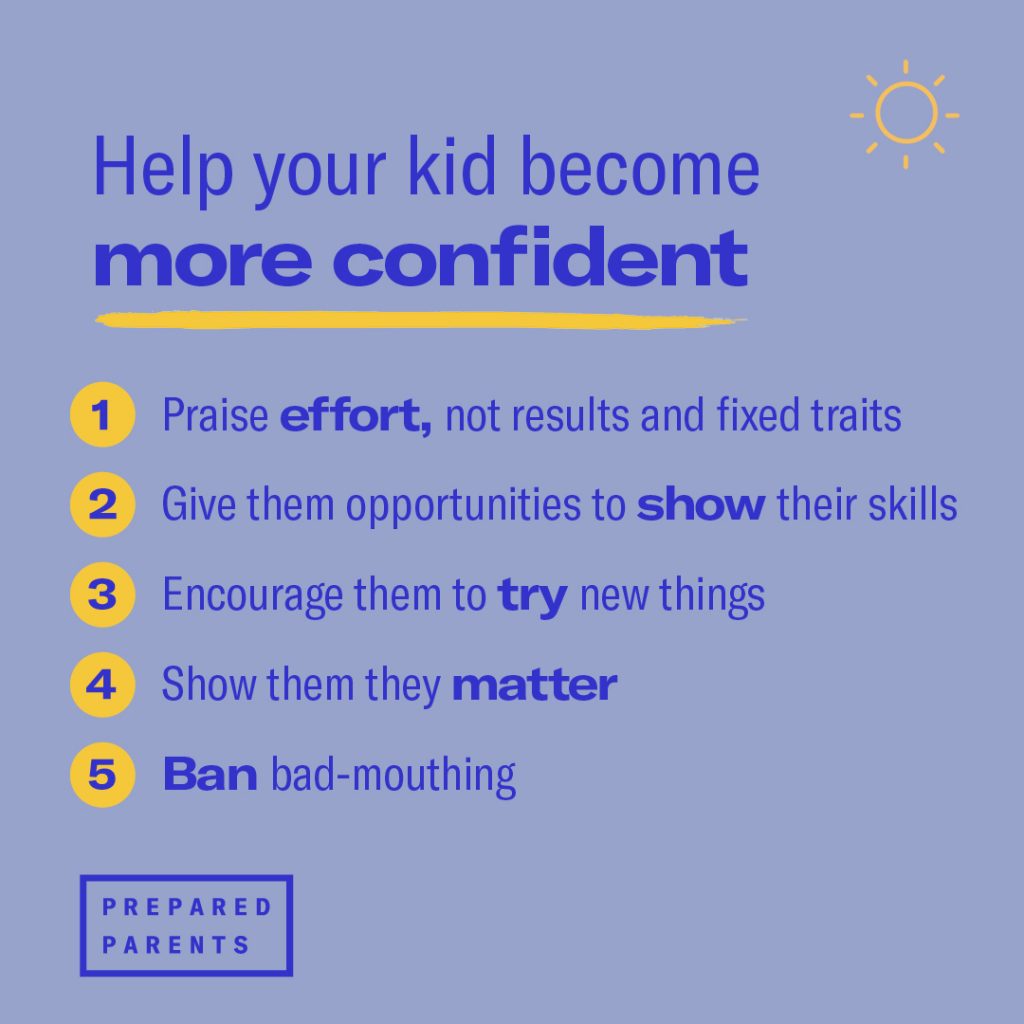Like the Little Engine that could, your kid is only held back by whether or not they think they can. Confidence is the first step to doing. So like that engine that labored up the hill by saying, “I think I can, I think I can, I think I can,” so can your kid.

Simply put, confidence is a belief in your abilities. Confident kids believe they are skilled and believe in their ability to learn or perform new skills and behaviors using what they already know. By acknowledging what they can already do, giving them opportunities to show their skills, and encouraging them to continue learning and growing new skills, you’re empowering your kid to achieve even more.
Research suggests that self-confidence—the belief in yourself—is central to your ability to achieve. Believe it to achieve it! Put another way, a belief in yourself is a great predictor of whether you’ll actually end up doing something in the end. Studies show, though, that as kids mature, their confidence drops. Perfectionism, people-pleasing, and social competitiveness kick in, and suddenly, a kid can feel like they’re a total failure. You can help your kid be more confident by acknowledging their abilities, giving them many opportunities to show their skills, and encouraging them to continue learning and growing new skills.
Girls, in particular, are at risk. Between the ages of 8 and 14, a girl’s confidence level drops by 30 percent.
Praise effort, not results and fixed traits.
Help your kid see they can achieve by praising the effort they put into their work (“I am impressed with all of the hard work you put into this project!”), rather than the results they get (“You got an A!”) or the traits that get them there (“You’re so smart!”). This shows them if they did this project, they can do another one, too.
Focus on their effort with encouragement:
- “You are getting better and better at multiplication.”
- “I admire your attention to detail in building that castle—it really made a difference.”
- “Seeing you power through setbacks day after day really makes me proud.”
Rewarding the effort, not the outcome will help your kid find intrinsic motivation in what they do. They’ll find the behavior personally rewarding simply because they like to do it, not because of some type of reward.
Take time to reflect on the full experience with your kid. Ask them about the challenges they faced and celebrate the ways they overcame those obstacles. Try not to praise your kid’s fixed traits, those qualities that tell a kid who they are, like smart, pretty, or athletic. Instead focus on the effort that got them to where they are. That’s the source of the skills they are building.
Give them opportunities to show their skills.
If confidence is about building your kid’s belief in their abilities, we need to give them opportunities to practice those abilities. For example, this could look like allowing kids to choose small tasks or chores, like doing the dishes or taking out the trash. Before assigning a chore, though, talk with your kid about the importance of the work and why their contribution is important. Helping them find purpose in the work can be the make-or-break factor in their feeling obliged versus motivated to do it.
Encourage them to try new things.
The beauty of building confidence is that it allows our kids to build from the things they already know or are good at doing. For example, if your kid is confident in drawing, what more can they do with it?
Encourage them to pursue new interests by following their curiosity. What are the things that strike a chord for them? What gets them excited? Help them find new ways to explore those interests.
Along the way, remember to celebrate small wins (praise the effort …) because while our kids might be building their confidence in an ability, they are inevitably going to hit roadblocks and bumps.
Be a mirror to your kids.
Letting your kid know they are loved, valued, and belong is a confidence-builder and reflects back to them (like a mirror) your belief in their ability to achieve. When you’re giving them positive praise, take the extra moment to make the moment special—eye contact, a pat on the back, maybe a hug. Part of your kid’s confidence is feeling loved and valued by you. As a parent, you can be a huge confidence builder for your kid.
Ban bad-mouthing.
Beware of the confidence destroyer of negative talk. Avoid critical words that a kid might internalize as a truth about them and their ability to achieve. If your kid suffers from low self-confidence, work with them on the “Confidence in me activity” worksheet below to show them just how especially skilled they are.

